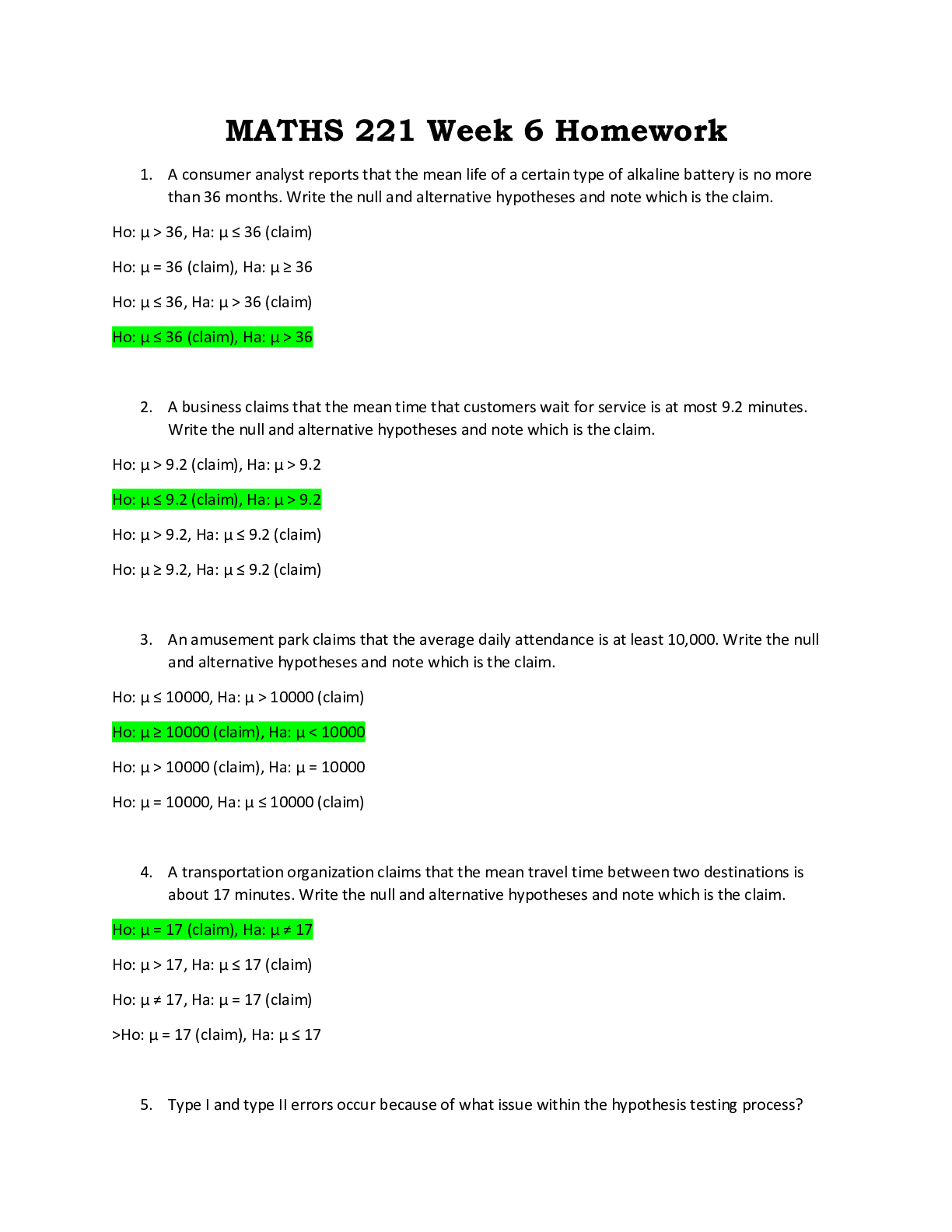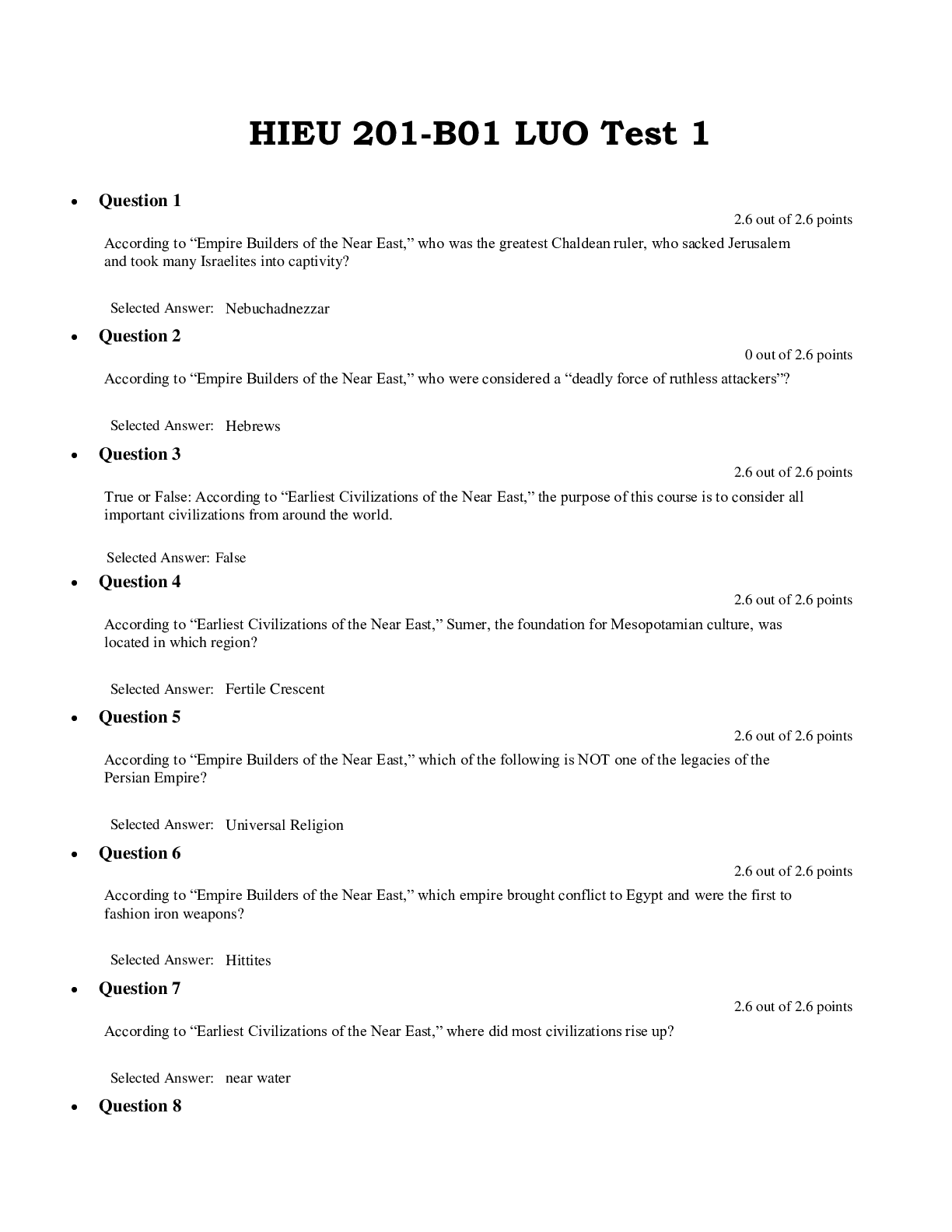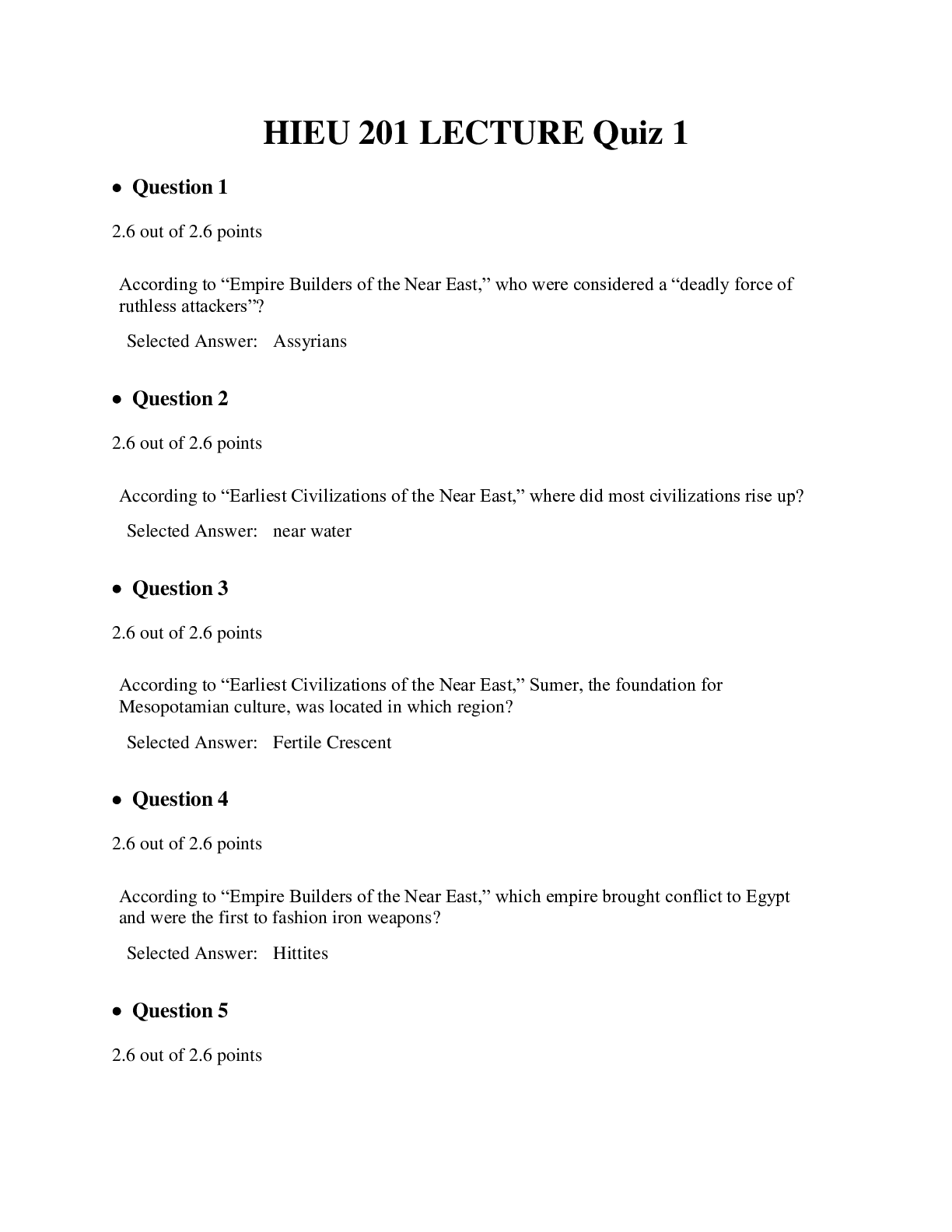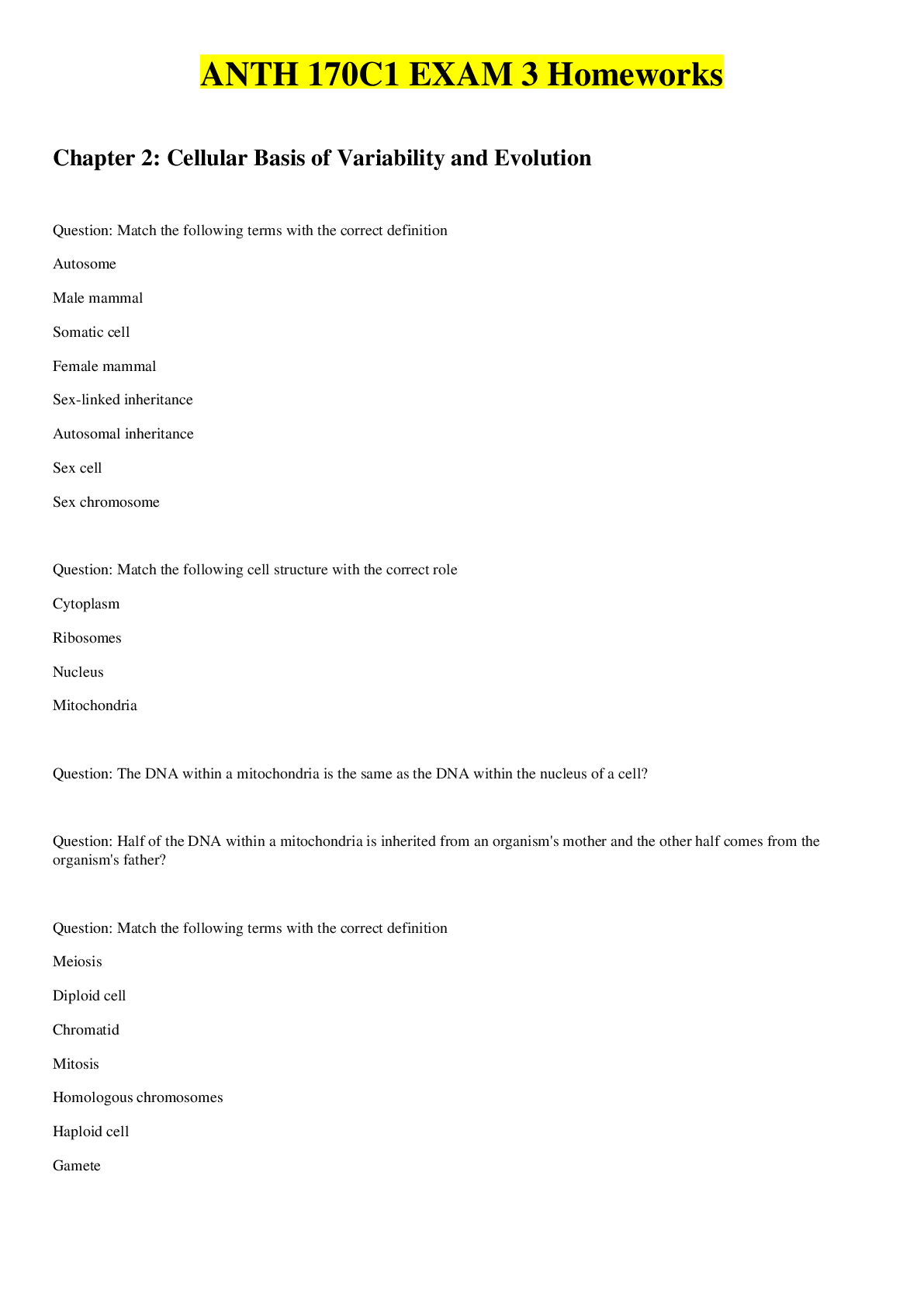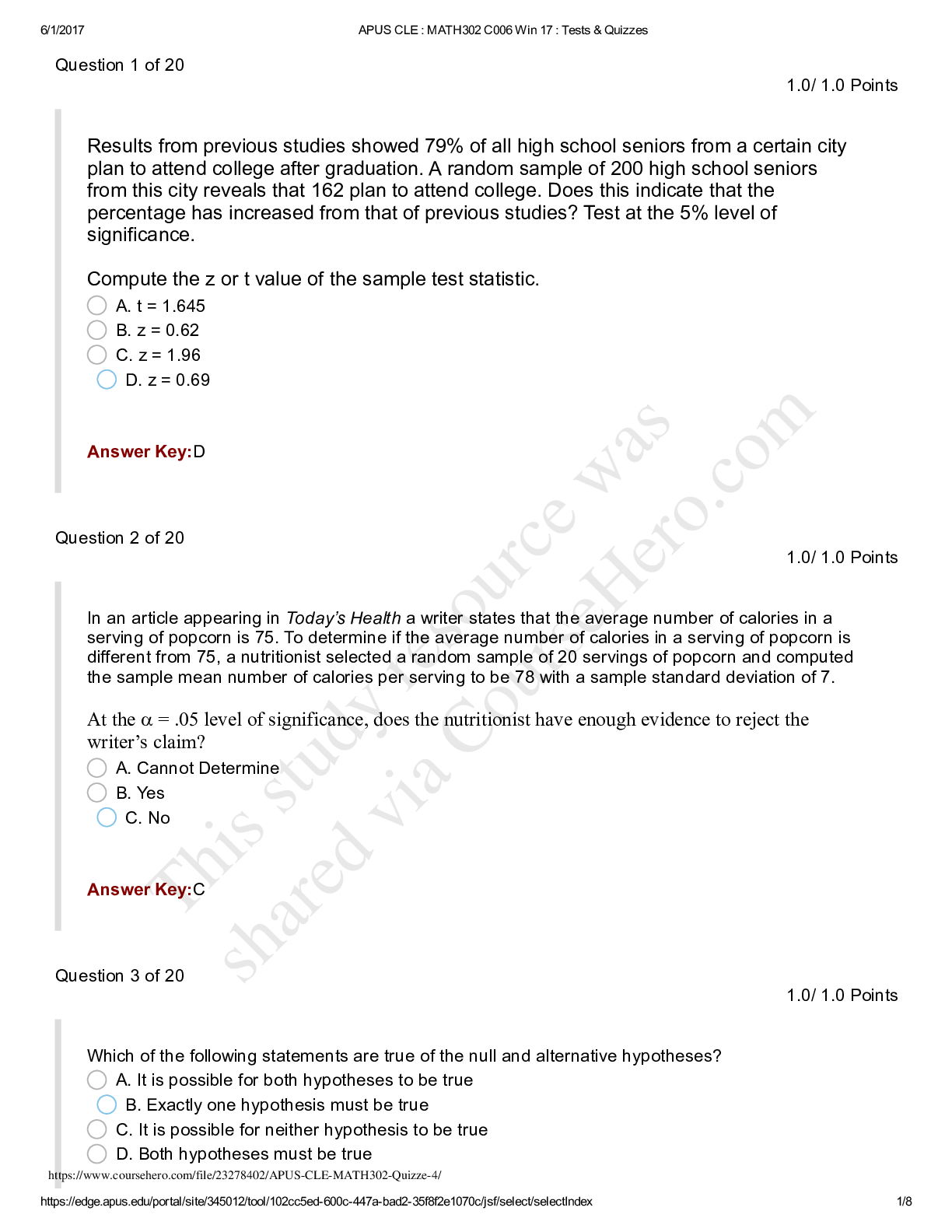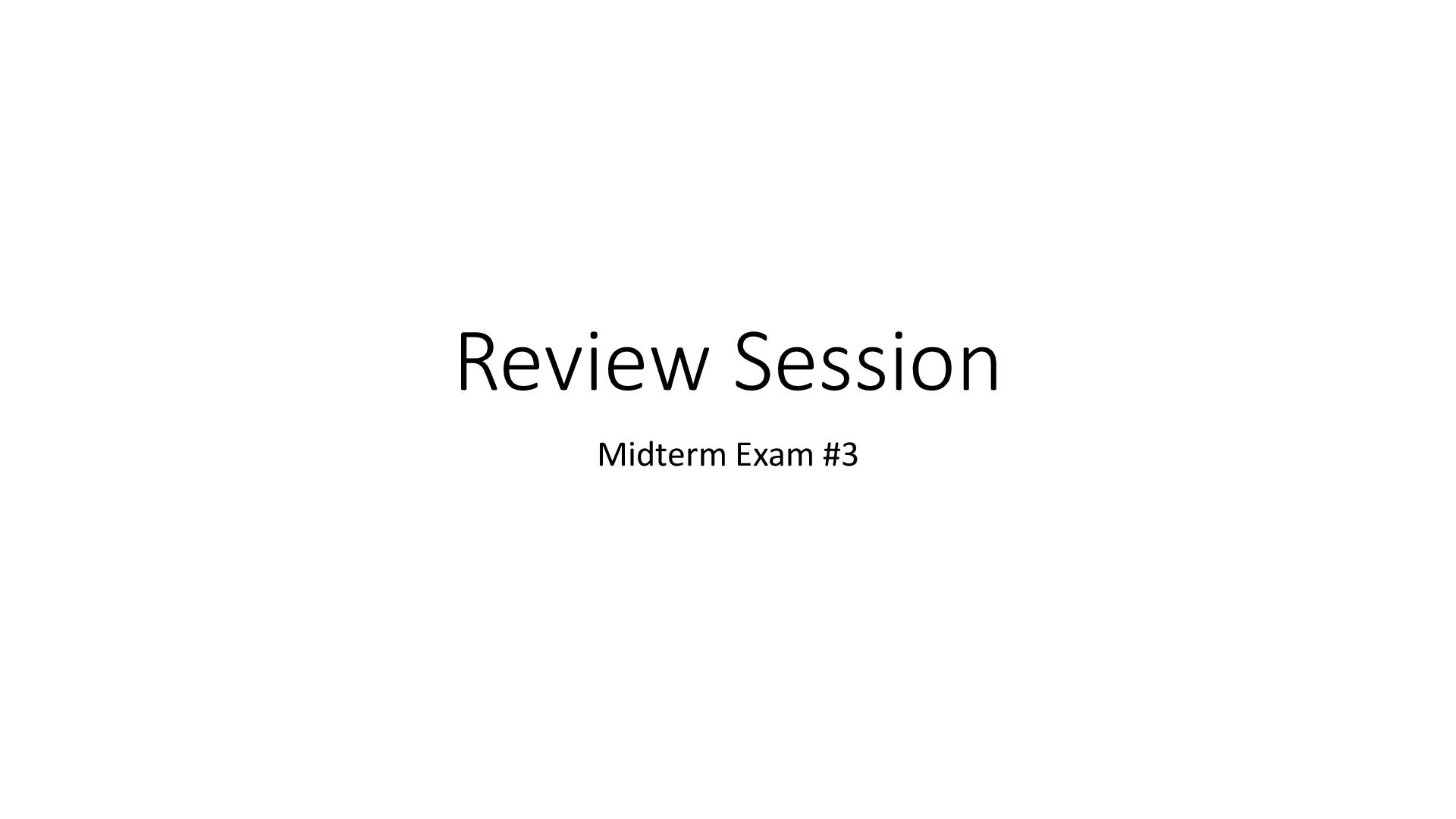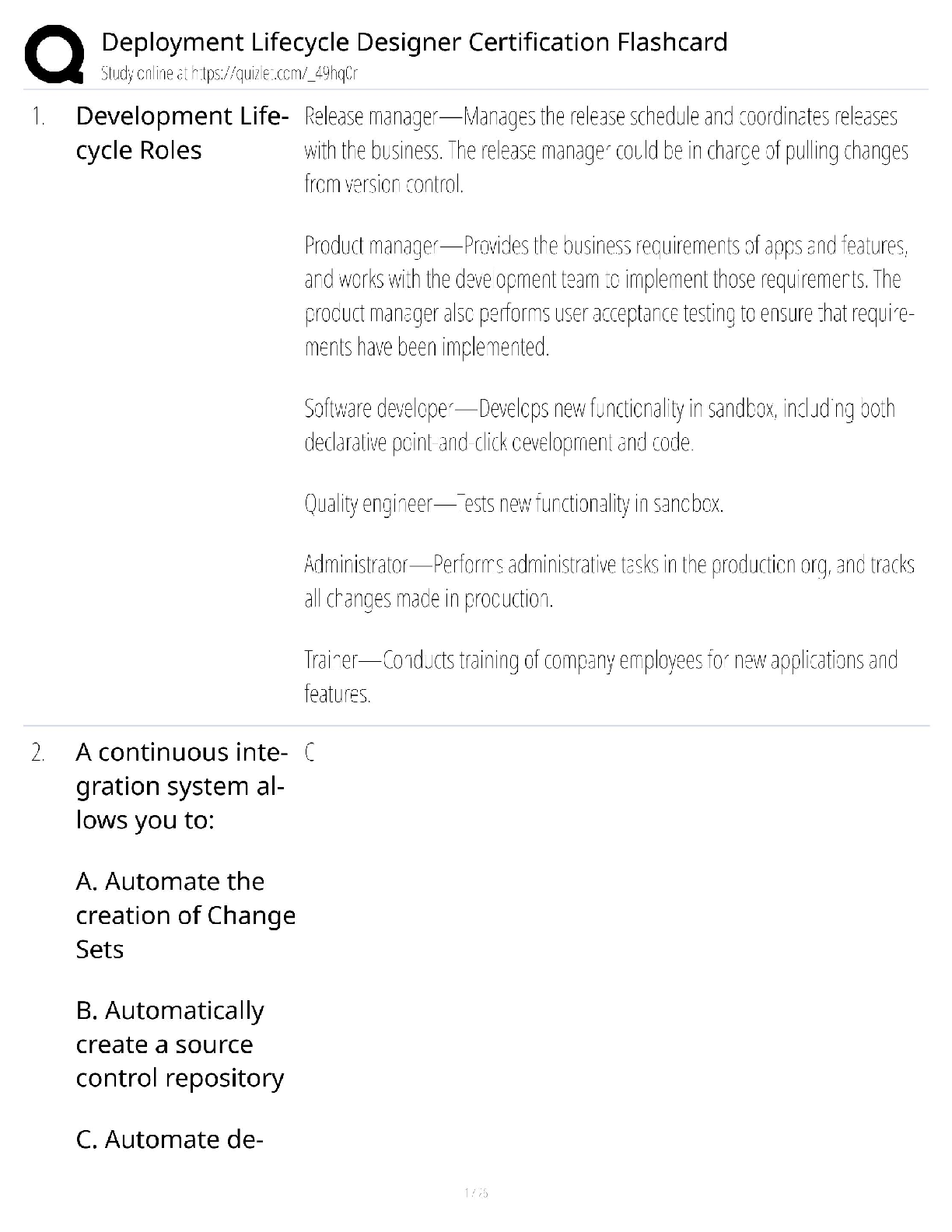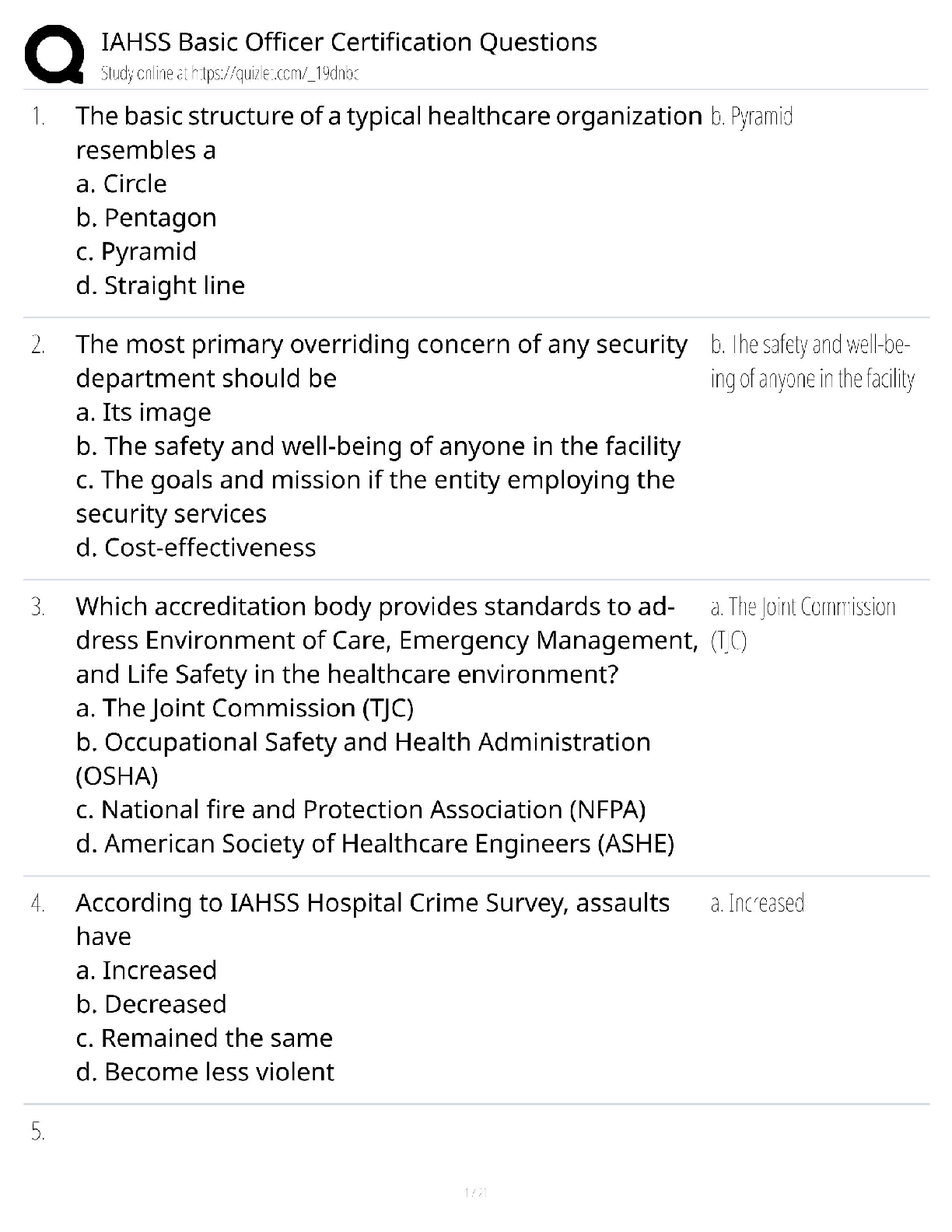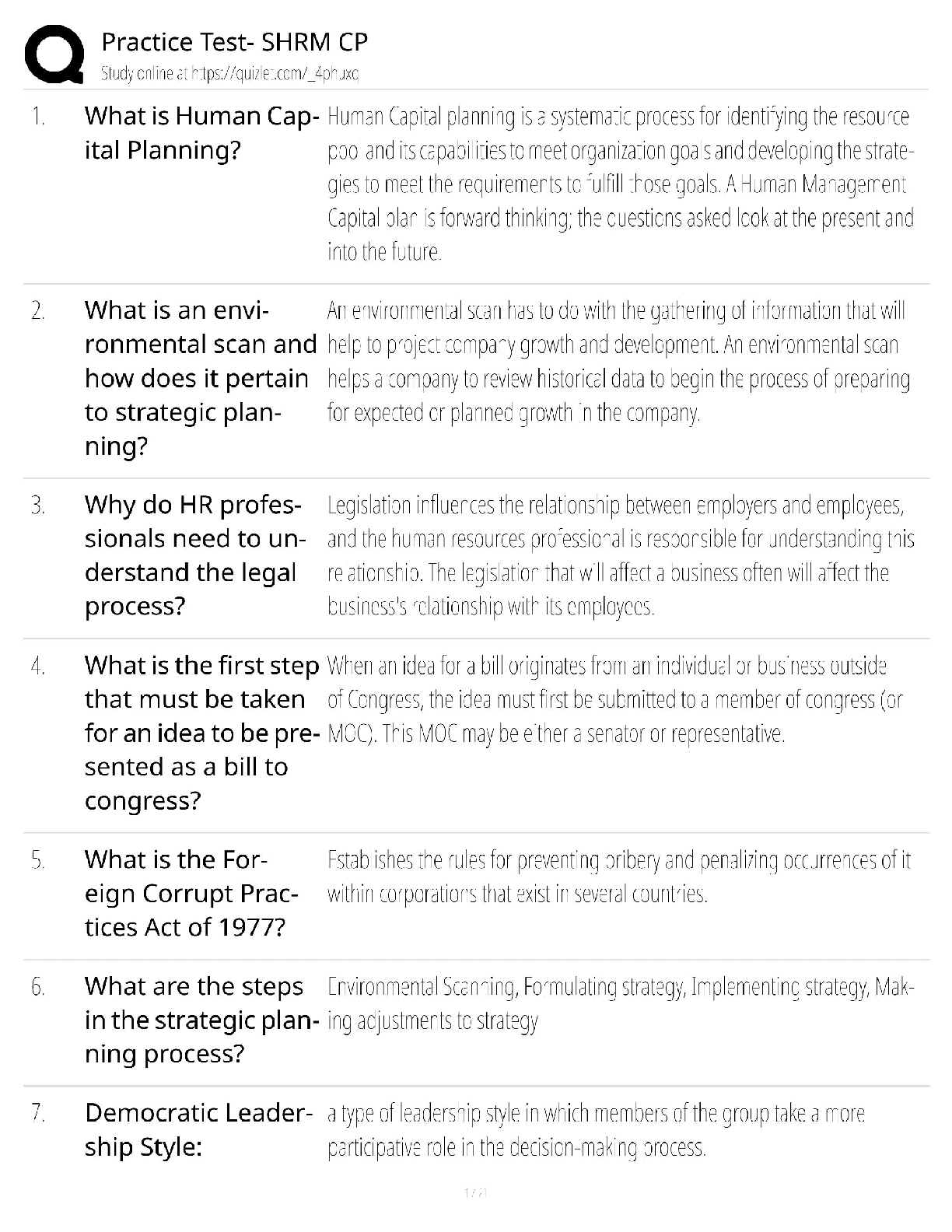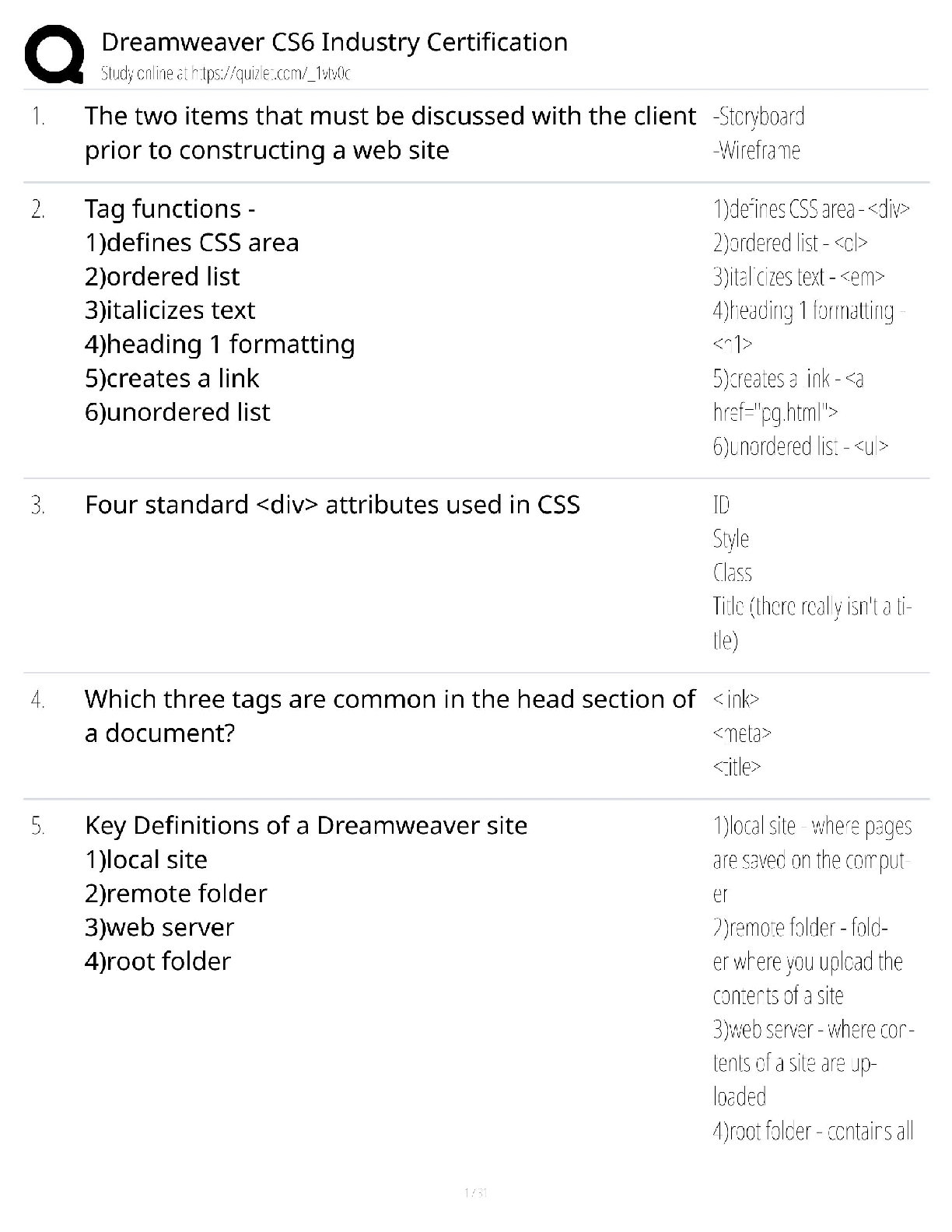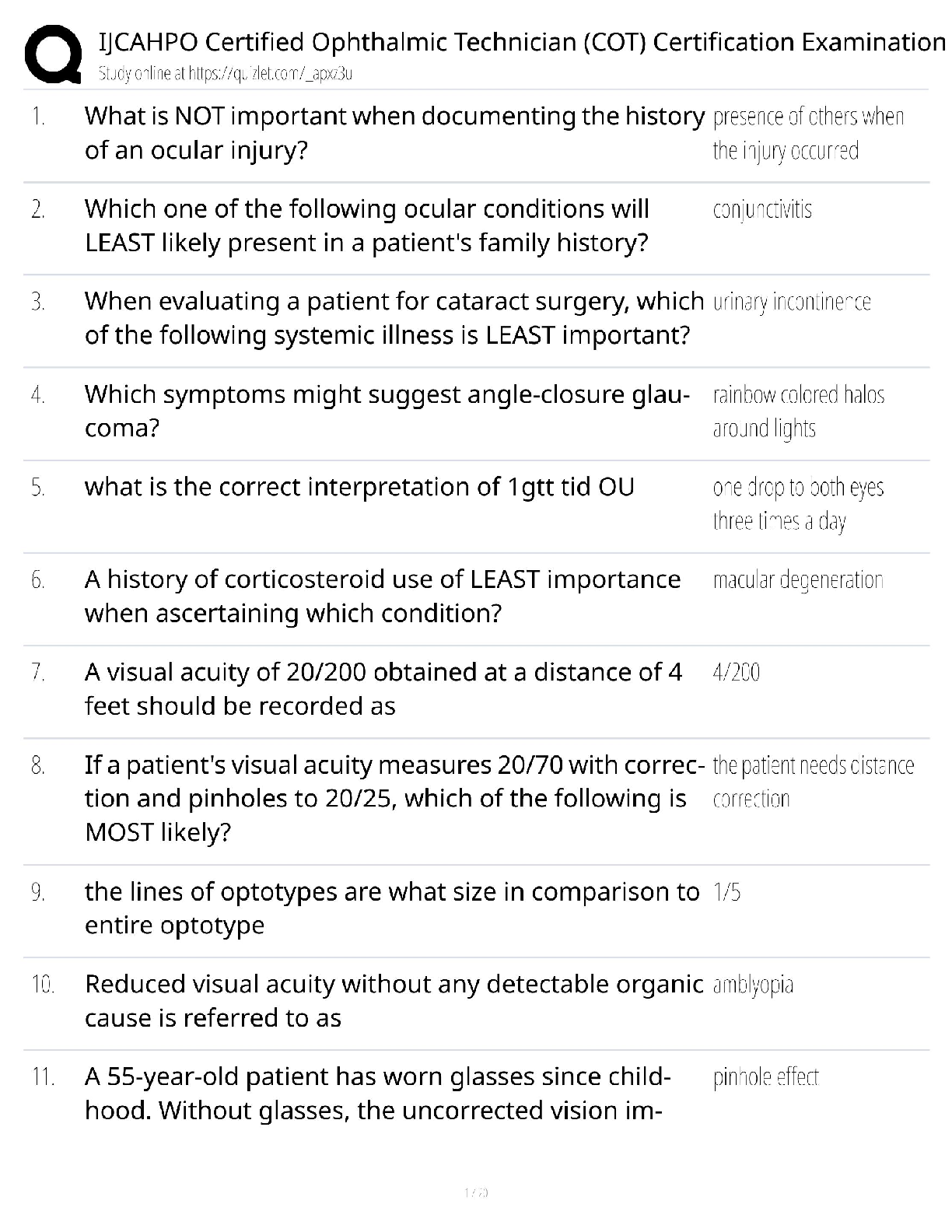Religious Studies > QUESTIONS & ANSWERS > THEO104 Study Guide Week 1-8 Module Week 1 Module week 1 Introduction to Theology - Module Week 8 Co (All)
THEO104 Study Guide Week 1-8 Module Week 1 Module week 1 Introduction to Theology - Module Week 8 Completed for 2022/2023
Document Content and Description Below
THEO104 Study Guide Week 1-8 Module/Week 1: Introduction to Theology Textbook Readings: Towns: Introduction & Ch. 1 Introduction 1. How did the term “Christian” originate? Who wa ... s this book written for? 2. Why do some have mistaken ideas about Christianity? Chapter 1 1. What year was Jesus born? 2. When was Christianity made Rome’s national religion? 3. What is the Incarnation? 4. Does the Bible states that Jesus was the creator of the world? 5. Did Jesus claim to have supernatural origins? 6. Who baptized Jesus? 7. Did Jesus allow people to worship him? Etzel & Gutierrez: Introduction & Chs. 1–5 1. Why does the author say that everyone is a theologian? 2. What areas of our lives are influenced by the way we see God? 3. How did Jesus show that he is worthy of our faith? 4. Do Christians need to ignore intellect and reason in order to have faith in Jesus? 5. What does Jesus teach about truth? Online Excerpts: “Understanding the Faith” 1. What is more important than the sincerity of your belief? 2. What are the six types of faith that describe the believer's relationship to God? “Prolegomena to Theology”—Pg. 18–24 1. What are the four tools for accurately arranging a systematic theology? 2. What four questions must we ask about faith? 3. What 5 factors can limit our theology? “The Names of Christ” – Pg. 160–173 1. What chapter of the New Testament does the author suggest contains the most names of Jesus? 2. Which of God’s names do some scholars think that Jesus is claiming with his “I am” statements? 3. What is the term “only begotten” used to describe about Jesus? 4. Why does the author think that the Gospel of John calls Jesus the “word”? 5. What would Jews think who heard Christ calling Himself the “Son of Man”? “The Deity of Christ”—Pg. 155–160 1. T/F Jesus Christ is the second member of the trinity, is equal with the father in nature and yet submissive in duty. 2. T/F Christ was a single and undivided personality. 3. T/F Jesus claimed to be one with the father. 4. T/F Jesus claimed to have the ability to forgive sins. 5. T/F Jesus allowed people to worship him. 6. T/F Jesus claimed to have omnipresence, omniscience and omnipotence. 7. What does the term “preexistence” mean? 8. What does the term “eternality” mean when referring to Christ? 9. T/F The fact that Christ allowed people to worship him shows that He thought that he was divine. Module/Week 2: The Bible Textbook Readings: Towns: Ch. 2 1. What does dual authorship mean? 2. What was the Old Testament written on? 3. What are the three divisions of the Old Testament? 4. What did the Psalms scroll contain? 5. What is a codex? 6. Where does the name “Bible” come from? 7. Where does the term “Scripture” come from? 8. *What are three ways the Bible can influence its reader? Etzel & Gutierrez: Chs. 6–10 1. Who is God's revelation available to? 2. Is general revelation enough to bring someone to salvation? Why? 3. What is the significance of the fact that the words of the Bible were inspired by God? 4. Inspiration and Inerrancy apply to which manuscripts? 5. What is the discipline that studies the principles and theories of how texts ought to be interpreted? 6. What are the three basic steps to understanding the Bible? Online Excerpts: “Preservation: Insuring the Authenticity of the Text”—Pg. 73–78 1. What is “Textual Criticism”? 2. What is “lower Criticism”? 3. What is “Higher Criticism”? “Inspiration: Guaranteeing the Word of Scripture”—Pg. 59–72 1. What are the four qualities of inspiration? 2. T/F Inspiration incorporates the personality of the writer into the final product. 3. What does Conceptual inspiration state was inspired? 4. What does partial inspiration state? 5. What does limited inspiration state? 6. According to the text, what is “Bibliolatry”? Who was accused of it? 7. According to the text, about what percent of the New Testament is either quotation or allusion to the Old Testament? 8. What are the 5 arguments for inspiration/inerrancy? “Canonicity: The Standard for Including Books in Scripture”—Pg. 79–88 1. What four criteria determine that a person is a biblical prophet? 2. What are the 12 main arguments against adding the Apocrypha to the canon (the Bible)? “Arguments that the Bible is the Word of God”—Pg. 43–48 1. What three arguments are the basis for arguments from revelation? 2. What empirical evidence sets Christianity apart from other belief systems? 3. Name two sources that establish an early date of scripture. “Bibliology”—Pg. 28–42 1. What is Revelation? 2. What is inspiration? 3. What is inerrancy? 4. What is the Canon? 5. What is hermeneutics? 6. What is illumination? 7. What does Hebrews 1:1–2 teach about divine revelation? 8. What are the two areas of revelation? 9. What is special revelation? 10. What is reason? 11. What does the Cosmological argument state? 12. What 3 things is the Cosmological argument dependent upon? 13. What does the Teleological argument state? 14. What does the Anthropological argument state? 15. What does the Anthropological argument reason? 16. What does the ontological argument state 17. What does congruity mean? . 18. What does the existence of laws imply? 19. What does law in society give evidence of? Module/Week 3: Mankind and Sin Textbook Readings: Towns: Chs. 8 & 10 Chapter 8 1. What point does the author illustrate with an elephant and 4 blind men? 2. Do Moslem leaders claim that Christianity and Islam are alike in that Allah was “the God and Father of our Lord Jesus Christ?” 3. What are the 4 questions that Darwinians have not been able to answer? 4. What question did the old Presbyterian catechism address first? 5. What do Christians believe the source of suffering to be? 6. What two reasons does the author suggest that we can know that Christianity actually explains life as we know it? 7. What is the relationship to works and salvation? Chapter 10 1. What is the relationship to works and salvation? 2. Why do Christians do good works? Etzel & Gutierrez: Chs. 11–15 1. Does the image of God refer to something a human is or something a human does? 2. Being created in the image of God should help to point one another to whom? 3. Is the image of God mentioned in both the Old Testament and the New Testament? 4. What ideas are included in the six different Greek words in the New Testament that talk about sin? 5. What does the heart represent in the Bible? 6. What are the three aspects of the human personality? Online Excerpts: “The Fall of Man” 1. Satan began his temptation of Eve by placing doubt in her mind concerning what? 2. T/F: Prior to the Fall recorded in Genesis 3, Adam and Eve were all-knowing. 3. How much time did Adam and Even spend in Eden before they sinned? 4. What did Adam and Even do when God began to question them concerning their sin? 5. When Satan tempted Even in the garden, he appealed to what three avenues of temptation? “Origin of Humanity”—Pg. 556–560 1. What are 4 reasons to question evolution? 2. What is the difference between an open and closed system? 3. What is Fiat Creationism? 4. What is Deistic Evolution? 5. What is Theistic Evolution? 6. What is Progressive Creationism? 7. Which two possibilities of Creationism does the author say are closest to scripture? “Creation in the Image of God” 1. T/F: All of creation is created in the image of God. 2. T/F: The image of God in man solely refers to his immaterial nature. 3. T/F: Only Christians maintain the image of God. 4. T/F: The image of God in man was lost as a result of the fall of man. 5. What four primary aspects are included in the image of God? “Essential Elements of Sin” 1. What are the two types of sin that exist? 2. Does God tempt man to sin? 3. Is it a sin to be tempted? 4. What are the four kinds of sin discussed in the article? 5. What are the spiritual consequences for sin? “The Material and Immaterial Aspects of Man” 1. What terms are usually used to describe the various aspects of the immaterial nature of man? 2. The extensive use of which word places it in a position of supreme importance in Biblical psychology? 3. T/F: The use of the term “heart” is best understood by simply saying “me.” 4. What is the conscience? 5. What helps to develop the conscience in man? 6. Why is man described as essentially evil? 7. T/F: The heart of both the saved and unsaved is capable of being deceived by sin. 8. T/F: The heart can be “hardened” because of sin. 9. What does it mean to say that the soul-spirit is “amoral”? Module/Week 4: Jesus Christ Textbook Readings: Towns: Chs. 4 & 6 Chapter 4 1. List the eleven proofs of Christ’s resurrection. 2. T/F: Jesus predicted His death and resurrection. Chapter 6 1. What does the Greek word proseuchamai mean? 2. T/F: The Lord’s Prayer embryonically contains everything a Christian must know and every way that a Christian must pray. 3. *Since a Christian has the righteousness of Christ, what should he do daily? Etzel & Gutierrez: Chs. 16–20 1. “The making of enemies into friends by averting the punishment that their sin would otherwise incur” defines what word? 2. What was the Day of Atonement? 3. T/F: One difference between the sacrifices of the Old Testament and the sacrifice of Jesus is that Jesus' sacrificial offering for sin was permanent. 4. Understand the significance of the various Greek words used in the New Testament for “redemption.” 5. It has been said that the story of the Bible could be summarized with what word? 6. Does the Bible affirm that Jesus is both 100 percent God and 100 percent man? 7. T/F: The Bible records the virgin birth as a fact? 8. What is the central claim of Christianity? Online Excerpts: “New Life in Christ”—Pg. 298–307 1. What is the term that describes why we have a legal standing by which we are declared righteous before God, and, on the basis of this judicial act, the Christian enjoys the life and peace of God? 2. Who is the first person in the Bible described as having been justified by faith? 3. According to the excerpt, which two words are linked in Scripture, in that both come from the same word “dikaios?” 4. When does Justification occur? 5. What four words does Paul use in Romans 6 to aid us in applying this truth to our Christian life? Explain. 6. What is Sanctification? 7. How do some wrongly define sanctification? 8. What is Positional sanctification? 9. What is Progressive sanctification? 10. What is Prospective sanctification? “The Virgin Birth of Christ”—Pg. 184–191 1. What Old Testament Authors spoke about Christ’s future birth? 2. Why is it essential that Christ have been born of a virgin? 3. What are the two meanings for the word ‘almah?’ 4. What does the author believe is the best translation for the word ‘almah’ in Isaiah 7:14? “The Nature of Resurrection”—Pg. 238–245 1. What is the biblical definition of death? 2. What did the Roman soldiers do (and not do) that showed that Jesus was dead? 3. After Jesus’ resurrection, what became his new responsibilities? 4. What were five things that Jesus accomplished through His resurrection? “The Death of Christ”—Pg. 213–224 1. What is “vicarious suffering”? . 2. What is a “vicar”? 3. What does the word “redemption” mean? 4. What does the word “propitiation” mean? 5. What does “reconciliation” mean? 6. What is a “sin nature?” 7. What is “imputed sin?” 8. T/F The law is a unit; to break one is to break all. 9. How is every person a sinner on three counts? 10. What is the difference between judicial guilt and personal guilt? 11. T/F Man is not reconciled to God through the blood of Christ; rather, the moral and noble life of Christ should compel man to seek after God. Module/Week 5: Salvation Textbook Readings: Towns: Chs. 3 & 5 Chapter 3 1. According to the author, Christ’s death was ________. 2. Where was Jesus crucified? 3. What day does the author believe Jesus was crucified? 4. What were the two accusations made against Jesus? 5. What two men asked to bury Jesus’ body? 6. What did the blood and water that Jesus shed show? 7. What is a substitutionary death? 8. What is a redemptive death? 9. What does propitiation mean? Chapter 5 1. According to the Bible, what is conversion? 2. What are the three parts of a conversion experience? 3. T/F: One can be saved by a choice alone. 4. T/F: Feeling remorse over your sin is enough to save you. 5. T/F: The terms “regeneration” and “born again” have the same meaning. 6. T/F: Conversion is what God does in a sinner’s life. Etzel & Gutierrez: Chs. 21–25 1. Where in the Bible can the idea of regeneration be found? 2. What two components could be viewed as salvation from the perspective of the individual? 3. What does it mean to be justified? 4. How does Grudem define Justification? 5. Understand the three aspect of sanctification. 6. Why is mankind in opposition to God? 7. T/F: Repentance and feeling sorry are basically the same thing. 8. God provides us with the faith to do what? Online Excerpts: “Election and Salvation”—Pg. 426–434 1. What are the five points of Calvinism? 2. What does “total depravity” mean? 3. What is “Unconditional election?” 4. What is “Limited atonement?” 5. What is “irresistible grace?” 6. What does the author give as an alternative to perseverance of the saints? “What is Conversion”—Pg. 287–298 1. What is Regeneration? 2. What are the results of Regeneration? 3. The term anothen, translated “born again,” can also be translated as what? 4. T/F Adam died physically within days of eating the fruit in the Garden. 5. T/F As a result of Adam’s sin, everyone is born into the world spiritually dead because of trespasses and sins. 6. T/F When a person receives Jesus Christ, he becomes a new creation, and the sin nature is eliminated. 7. What are the three steps that the “Roman’s Road” teaches one must know to be save? Explain. 8. How is sin like a marathon runner who misses beating a record by three seconds? 9. What part does baptism play in the salvation process? “The Weakness of Arminianism”—Pg. 434–440 1. Who originated the theological system of Arminianism? 2. Describe the major tenants of the Arminian view. 3. What does Arminianism tend to limit its definition of sin to? 4. Do Arminians believe in Eternal Security as Baptists do? “Hell's Best Kept Secret” (audio clip) 1. What percentage of converts did the lecturer say he found were falling away from the faith? 2. What was the lecturer’s point with his illustration about the 2 men on a plane? 3. What was the lecturer’s point concerning Groaninzin’s disease? 4. Why does the lecturer suggest that when sharing our faith, we should start with the natural and then go to the spiritual? 5. According to the lecture, what did John Wycliffe, Martin Luther, John Wesley and Charles Spurgeon have in common in the gospel message? 6. What does the lecturer suggest NOT to preach in the gospel message? Module/Week 6: The Church Textbook Readings: Towns: Chs. 9 & 11 Chapter 9 1. What did Jesus say was the Greatest Commandment? 2. What did Jesus say was the second greatest commandment? 3. Does the Bible refer to a church as a building or a denomination? 4. Does the Bible refer to the church as a community of believers? 5. What are two benefits of mentoring? 6. List and explain the seven pictures the New Testament uses to describe the church. 7. What is it about local churches that so many misunderstand Christianity? Chapter 11 1. When did Christianity become Rome’s national religion? 2. What was the Ulster revival? 3. What did European missionaries do wrong in their approach? 4. What is “trickle down” influence? 5. What is “bubble up” influence? 6. Which is more effective, the “trickle down” influence or “bubble up” influence? Why? 7. When is a nation considered to be “Christianized”? 8. T/F Oikos conversion in the New Testament is the promise that the presence of one Christian in a family guarantees the eventual conversion of all other family members of his family. 9. What term do foreign missionaries use to describe oikos conversion? 10. What is a “people movement”? 11. How did the term “the Protestant work ethic” come about? 12. What does “Redemption and Lift” refer to? Etzel & Gutierrez: Chs. 26–30 1. What is the meaning of the Greek word baptisma? 2. Do the followers of Jesus in the New Testament get baptized before or after they profess their faith in the risen Jesus? 3. T/F: Participating in Communion is a step of obedience to Christ's command. 4. T/F: The Bible describes the local church as a building where people meet together. . 5. What does the author mean by the phrase, “We are not corporately more than what we are individually”? 6. Who is the “head” of the church? Jesus. 7. What are the different kinds of “church government” described by the author? 8. What is the mission of the church? 9. T/F: It is important to be a member of a church because it is an indication of your commitment level to that local congregation. 10. T/F: Church discipline can only be effectively administered if, and when, individuals are committed to and connected with a local congregation. Online Excerpts: “Organization of the Church”—Pg. 672–675 1. How is the church both an organism and organization? 2. List 13 ways the New Testament Church was organized? “Theological Definition of the Church”—Pg. 649–651 1. What is a Church? 2. What are the two ordinances given to the church? 3. What is baptism symbolic of? 4. What is the purpose of the Lord’s table? Module/Week 7: Christian Life Textbook Readings: Towns: Chs. 7 & 12 Chapter 7 1. According to the Westminster Confession, what is sin? 2. List the principles that guide the Christian in discipling his life. 3. What are some of the main motivators for a Christian to discipline their life? 4. What shouldn’t be a motivator for discipline? 5. Why is legalism bad? Chapter 12 1. T/F The author believes that the great commission was Jesus’ command to his disciples and therefore it is faulty to apply it to all believers. 2. What are the two imperatives in the Great Commission? 3. What are motives for Christians to evangelize non-Christians? Etzel & Gutierrez: Chs. 31–35 1. What is the great commandment? 2. How many times is the great commission recorded in the Bible? 3. Is renewal in the life of a believer a one-time event or an ongoing process? 4. T/F: The indwelling and filling ministry of the Spirit is referenced exclusively in the New Testament. 5. What are the primary differences between the indwelling and the filling of the Spirit? 6. Which aspect of the indwelling/filling ministry of the Spirit deals with the character of the believer? Online Excerpts: “Habits of the Heart” 1. How does the author define “character?” 2. Where a ¬¬¬___________ results in inner power to do good, results in your habits that make you do good. 3. Belief is more than a decision to accept Christ. It is the __________ that something is true. 4. You can’t determine your ______________, but when you have the right _____________ you get the best out of circumstances and rise above your circumstances. 5. A person with character is able to ________ _____ ___ __________ long after the ________ is gone that first motivated the choice. 6. What do you think was the most helpful portion of this article? Why? 7. Do you think you will change anything in your approach to life based on this article? Why or why not? 8. Did you agree with the article? Why or why not? “Prayer” 1. What are the seven kinds of prayer that the article listed? 2. What are seven conditions that hinder prayer? “What is Revival?” 1. What church’s revival does the author recount in this reading? 2. What started the revival in that church? 3. T/F According to the author, revival is only a recent phenomenon, a unique cultural event erupting in the late 19th and early 20th century. 4. How does the author define revival? “The Greatness of the Great Commission” 1. Geographically, to what portions of the world did Jesus command his disciples to take the good news? 2. What significant response did the disciples show Jesus when he appeared to them the third time? 3. What was Jesus’ systematic plan to preach the Gospel to the world? 4. What was Jesus’ last commandment called? What did it entail? 5. What are 4 lessons that the author suggests for the individual? 6. What are 4 lessons that the author suggests for the church? “Simple Steps to Solid Study” 1. List and explain MacArthur’s Five Step Bible Study method. “But What Does it Mean to Me?” 1. What does MacArthur feel about the belief that we should guard against preachers whose emphasis is on interpreting Scripture rather than applying it? 2. According to MacArthur, “There is no danger of _______; the real threat is an ________ attempt at _______.” 3. We don't make the __________; it is inherently so, simply because it is God's Word. 4. What are your thoughts on this excerpt? “Making Hard Decisions Easy” 1. What are the 10 Questions that the author suggests you should ask in order to make hard decisions easy? Module/Week 8: End Times Textbook Readings: Towns: Ch. 13 1. According to the author, what is one of the best arguments that Heaven is real? 2. How many heavens does Paul talk about? 3. What is the first heaven? 4. What is the second heaven? 5. What is the third heaven? 6. Does the author agree with the notion that “Heaven is nothing more than a state of bliss?” 7. Is there day and night in heaven? 8. Is there death in heaven? 9. What are nine of the “inexhaustible blessings of Heaven?” 10. Why did God give his children assurance that they would go to live with Him after they die? Etzel & Gutierrez: Chs. 36–40 & Conclusion 1. What four things do we learn from the ascension of Christ? 2. What is Jesus’ primary ministry now? 3. How many books of the New Testament mention the second coming of Christ? 4. Will Christ's second coming be a physical return or a spiritual return? 5. What did Jesus teach about heaven? 6. What are the three important things to remember about heaven? Online Excerpts: “The Nature of Prophecy” 1. What are six of the dangers to watch out for when studying prophesy? 2. What is the Amillennial view of the Kingdom? 3. Does the Amillenial view believe that the Old Testament predictions of the kingdom were fulfilled in a lit¬eral way? 4. Does the Amillenial view interpret prophetic Scriptures more figuratively or literally? 5. Does the amillennial recognize a distinction be¬tween Israel and the church? 6. What was the most popular view of the kingdom at the turn of the 20th century? 7. What does the Postmillennial view believe? 8. What is the Premillennial View? 9. When did the Premillennial view become popular? 10. What is “literal interpretation?” 11. Why is “Contextual interpretation” important? 12. What is “Double Fulfillment?” “The Rapture” 1. What happens at the rapture? 2. Who are the only two people that have entered heaven in a similar way to the rapture? 3. What does the word “rapture” mean? 4. Where does the word “rapture” come from? 5. Is it in the Bible? 6. Does the author see the rapture and the second coming of Christ as the same event? 7. Those who say the rapture will occur in the middle of the tribulation say that it will happen after what event? 8. What in Daniel helps to bring light on the timing of the Rapture? 9. Does the pretribulational view see a distinction between Israel and the Church? 10. What does immanency mean? “The Signs of the Times” 1. What two religious groups have predicted Christ’s coming incorrectly? 2. Where do some commentators believe that Jesus was chronologically outlining the characteristics of this present age? 3. Where do some commentators believe that Jesus was outlining the future events of the church age? 4. What things did Ezekiel prophesy would happen with Israel? 5. What has come to pass? 6. What has not yet come to pass? 7. What are some of the implied Signs of the Times? “The Judgments” 1. What are the 5 crowns that are listed to describe the rewards in scripture? Explain. 2. What happens at the “Great White Throne Judgment?” 3. What is the “Separation of the Sheep and Goats Judgment?” . “Hell: The Eternal Abode of the Unsaved” 1. Is there any difference between Hell and the Lake of Fire? 2. What is the common word for hell in the Old Testament? 3. What does “Sheol” mean? 4. How is the Hebrew word “Sheol” translated into Greek as? 5. What are six characteristics of hades shown in the story of the rich man and Lazarus? 6. What is the “Second death?” 7. Who did God design hell for? [Show More]
Last updated: 3 years ago
Preview 1 out of 44 pages

Buy this document to get the full access instantly
Instant Download Access after purchase
Buy NowInstant download
We Accept:

Reviews( 0 )
$11.00
Can't find what you want? Try our AI powered Search
Document information
Connected school, study & course
About the document
Uploaded On
Aug 22, 2020
Number of pages
44
Written in
All
Additional information
This document has been written for:
Uploaded
Aug 22, 2020
Downloads
0
Views
145

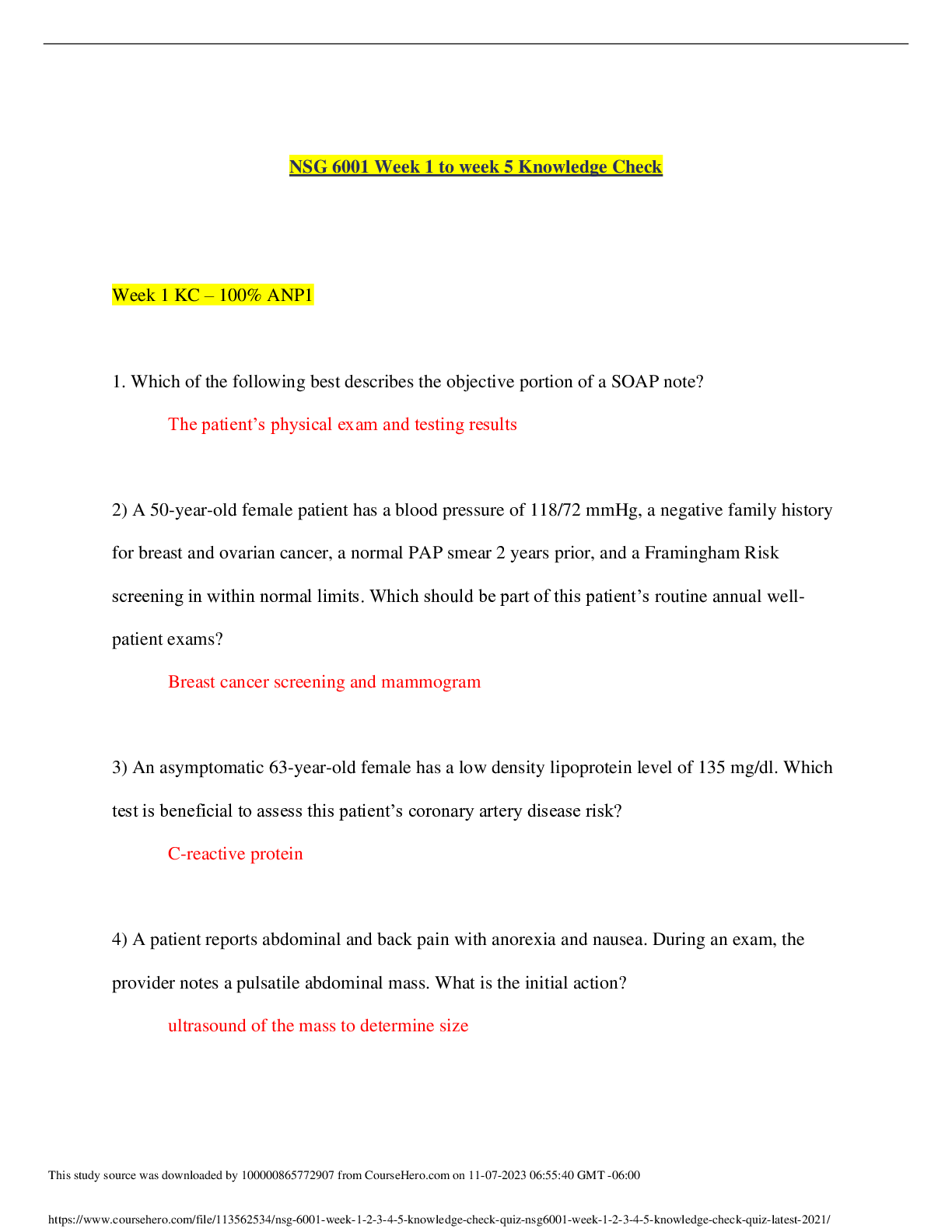

 (Diane Pacitti etc.png)
